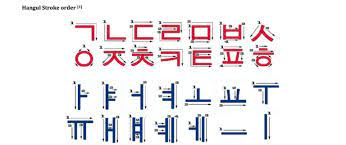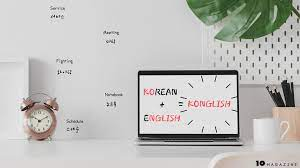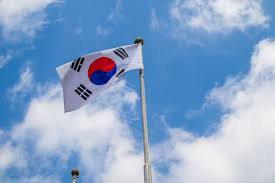There are five surprising techniques to learn Korean rapidly. To begin, it is useful to know that Korea ranks 11th in the world in terms of economy. Furthermore, more than 77 million people speak Korean, and Korea ranks 21st in terms of the number of speakers. If you want to study a language for job, for enjoyment, to watch dramas in their native language, or to comprehend songs and sing along with your favourite Korean singers. There are several techniques that will help you become proficient in the language. As a result, I'd like to share with you ten pointers.
1. Understand Hangul
At the start of learning any foreign language, you must completely know the alphabet. This will be an excellent starting point for your language learning journey. In actuality, as compared to other Asian languages, the Korean alphabet is not as hard as it appears at first appearance. Unlike other pictogram-based languages, Hangul was developed in 1443 by King Sejong. It was designed with the goal of being as user-friendly as possible. Koreans utilised Chinese characters before adopting Hangul. The Hangul alphabet has 24 letters (14 consonants and 10 vowels). The shape of the consonants is determined by the shape of the mouth during pronunciation.Vowels are just vertical and horizontal lines. It is not an exaggeration to state that you can learn Hangul in about two hours. Another advantage is that Hangul is a phonetic language. That is, it nearly always sounds written (with the exception of a few pronunciation rules, but they can be learned very quickly). For example, more than 60% of English words include letters that cannot be read (knee, wrist, daughter, island, etc.). In this aspect, Hangul is significantly simpler and easy to learn. You must pick a communication style based on the standing of the interlocutor. If you are new to the language, you should begin with an officially courteous manner.
2. Increase your vocabulary
After you've learned Hangul, you may start building your vocabulary. Start with numbers (in Korea, both Korean and Chinese numerals are utilised), days of the week, and simple conversational phrases. Then, add terms linked to your motivation for learning a language. If you decide to study Korean for a future trip, concentrate on vocabulary relating to mobility and transportation. Do you enjoy Korean cuisine? Then practise food-related vocabulary. And, when you learn new terms, keep track of them in a notebook. This will allow you to practise writing and memorise words. Memorization will be considerably more effective if you envision an image or video.
3. Use loanwords and Konglish-words to your advantage.
There are numerous loanwords and Korean-style English words in Korean, which are referred to as "Konglish" (Korean + English). Such terms are commonplace in the English language. Borrowed words are words that have the same sound and meaning as English terms. They are simple to remember since they sound like English with a Korean accent.
For example:
컵 (keop) = cup
카페 (ka-pe) = cafe
초콜릿 (cho-kol-lit) = chocolate
카메라 (ka-me-ra) = camera
택시 (taek-si) = taxi
인터넷 (in-teo-net) = internet
Other konglish words sound like English words, but have a different meaning. Koreans often shorten some English word to make a new konglish word:
에어컨 (air-con) = air conditioner
노트 (note) = notebook
Search basic konglish words online and you will be surprised at how many Korean words you already know.
4. Surround yourself with Korean culture.
Try to do it every day - this is the greatest approach to retain information. You may also change the language on your phone or create reminder notes in Korean for your regular daily tasks. Surrounding oneself with Korean does not imply learning every day for an hour. On the contrary, you can spend your leisure time in a reasonable manner. You may practise Korean during your commute to work or during your lunch break - gain from this. Use training cards to put your skills to the test, or download some fun educational games on your phone. If you frequently drive and utilise hands-free, then audiobooks and podcasts are ideal for you.If you truly want to learn Korean rapidly, there is always free time.
5. Define your learning style
One of the most basic, yet crucial, ways for swiftly learning a language is to identify your preferred learning style. There are three major kinds: (a) visual (visual memory works well); (b) auditory (ear absorbs and stores information better); (c) kinetic (memorization using movements). While some students utilise all three types, you may use your own basic one to aid enhance training efficacy. After you've determined which methods are best for your sort of training, you'll be relieved to realise that learning and memorising new terms is lot faster.
6. Collaborate with Korean teachers
Structural study utilising individual classes with an expert coach will offer you with an extra drive, which is simply required for a quick path in learning. The teacher will not only assist you in dealing with grammar challenges and techniques, but will also hold you accountable for reaching your goals. A skilled Korean teacher will tailor lessons to your specific learning style. Regardless of your objective, one-on-one courses with a competent teacher will help you to learn a language significantly faster (work or personal interest).
7. Look for companions / Korean buddies
Increasing your time spent talking is without a doubt the most effective approach to enhance your language abilities. On services like Meetup, you may find Korean language groups in your area. If there are no Korean communities near you, you can attempt to locate a partner on Facebook forums and groups, for example. Commit to meeting with your language partner once a week, and make it a rule to converse solely in Korean. Instead of simply conversing once a week, plan topics for discussion in advance to ensure a more extensive interaction. Another alternative for communicating is to utilise KakaoTalk, Korea's most popular communication app.Your Korean acquaintance may be your language friend, and he will almost surely install this app on your phone. By conversing with a native Korean speaker, you will learn slang, idioms, and enhance your pronunciation.
8. Participate in group activities
You may experience many exciting and humorous situations while you learn the language, but your drive may wane with time. Try to discover new ways to keep learning interesting and to refresh routine tasks, such as practising in groups with individuals who share your interests. In comparison to self-study, group Korean language sessions are more active. You may engage with other students, and the teacher can answer all of your questions right now. This is another excellent approach to improve your speaking abilities while also boosting your grammar and pronunciation.
9. Watch Korean dramas and listen to K-pop music
Include more Korean in your everyday life by watching dramas, films, and TV episodes, which can help you expand your vocabulary. If feasible, include subtitles, and write down and memorise all foreign terms. After a while, you'll be amazed by your brain's capacity to compare words and phrases with their meaning, even if you didn't have time to completely absorb them. Listening to Korean songs or radio is another beneficial habit to develop when learning a language. You are unlikely to grasp something after only hearing the music once. Try to locate keywords and extract a common meaning from them. Then you may sing along while listening if you want to enhance your pronunciation.
10. Complete absorption in Korean social life
If you have the time and money, immersing yourself in Korean culture is the finest method to learn the language. If you plan a vacation to Korea, you will be compelled to speak and read at every turn. Of course, many Koreans will be able to interact with you in English, but try to communicate entirely in Korean. Finally, mention that you are studying the language.
Conclusions
All of these strategies will help you learn Korean rapidly, but without a defined goal in mind, you will feel overwhelmed by the flood of fresh material. Set acceptable targets while developing a learning approach. It will feature helpful steps that will inspire you to set new goals. Instead of broad objectives like "I want to learn Korean rapidly," establish specific ones like "By the end of this month, I want to learn how to order at a Korean restaurant in Korean" or "By the end of this week, I want to compose an entire paragraph in Hangeul." Consider why you want to learn Korean. Set defined, measurable, attainable, and attainable goals with deadlines, and always remain focused.Finally, if you've read this far, you must be quite serious about learning Korean. Do not be discouraged if you make errors, and do not be afraid to step outside of your comfort zone to improve your speaking abilities. Native speakers will be delighted to assist you and will appreciate your efforts. Learning a language will take a long time and effort. However, doing worthwhile business is never easy. As a result, recall what encouraged you to study the language and rejoice whenever you achieve a goal.This will be quite enjoyable when you realise how much you already know in retrospect (read, write and speak Korean). You may begin now that you know the top strategies for learning a language rapidly. While some sites claim that you can learn Korean in 2,000 hours, all of these strategies will undoubtedly shorten the learning process.
************************











Comments
Post a Comment